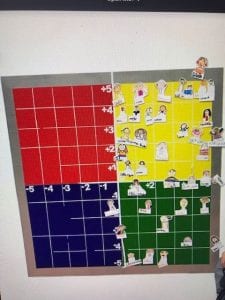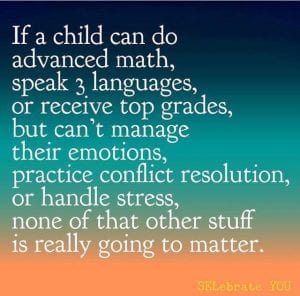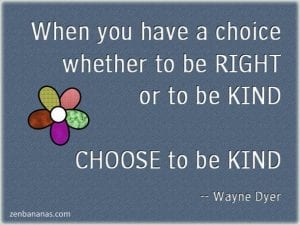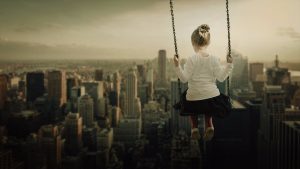
In January this year I, along with 10 of my St Luke’s colleagues, traveled to Barcelona to visit some of the best examples of Pre to Post school learning communities. We visited three schools; Collegi Montserrat, Collegi Mare de Déu dels Àngels and the Barcelona Learning Innovation Centre as a part of Our Dream School.
My expectations prior to travelling – I would maybe gain a broader understanding of school environments and a deeper understanding of how I may be able to assist in my roll to support teachers better at St Luke’s. I thought a lot would be lost on me, being the only non teacher travelling. What I experienced was an emotional roller coaster. I was inspired and hopeful, as a mother of two children with ADHD and anxiety, the holistic approach to education in all three environments spoke to me. I was also disheartened by how far behind our education system is in understanding the importance of both academic and emotional intelligence and how closely they are linked.
What was evident at all three schools, was educating the whole child from an early age. There was a strong focus on culture, and the positive impact of this was visible in all three learning environments. At Collegi Montserrat and Collegi Mare de Déu dels Àngels they started their morning exploring a College value, linking this, where possible to current happenings in the world. This value was then embedded in their curriculum giving it the same level of importance as academic subjects. At Collegi Montserrat we observed this occurring in an English class where students practiced concepts of sharing and respecting others by role playing how to ask for and acknowledge receipt of a book whilst developing their English skills.
There was a feeling of family in each space we visited. Students from the early years through to the seniors were independently learning. We saw children as young as 3 and 4 unsupervised moving within classrooms to locate books they needed and make their way back to where their teachers were located. No one needed to be “rounded up”, they got what they needed and returned. One little man was making his way down a large staircase, engaging with one of us and falling behind, neither his teacher or classmates stopped to hurry him along. He politely declined the offer of a hand to assist him down the stairs. He knew where he needed to be and he got there in the end. There was a an underlying calmness even with the noise of students working. There was no front of classroom, teachers moved freely throughout spaces, there to support children in their learning. Students engaged easily with us, confidently describing what they were learning and why. They appeared to work harmoniously in groups, working out among themselves which project tasks were best suited to each of their strengths. Independence was encouraged in subtle ways – a door for parents to enter and door for 3 to 5 year olds to enter.

Children were encouraged and expected to be independent and they were thriving. They were empowered, and the benefits of this were evident. This was an eye opener for a lot of us, to see how our culture can at times rob our children of their independence and hinder their emotional growth as well as impact on their self esteem by continually creating and enabling a dependence on us that is clearly not necessary.
At Collegi Montserrat, I was excited to see in hallways and learning spaces RULER charts.These charts were in every learning space from the young years up to the seniors. Students plotting how they felt throughout the day. Such a powerful tool. Most adults struggle to articulate how they feel and have no idea of where they are at emotionally at any given time. Most would describe only a handful of emotions (anger, sad, frustrated, happy) these children were able to express the underlying aspects of these surface emotions. What an amazing and simple gift to give a child. That level of self awareness allows you to be aware of those around you, more perceptive and compassionate.




What a wealth of information this provides you as an educator. A child struggling in class, a quick look at the board and there’s a small/large insight into what might be going on for that child. How differently would you handle the situation if you were to glance over and see that they’ve come back in from recess feeling scared/nervous/angry. Would this information change the way you engage with them? Change the experience that follows for them and you? The same applies for the students, they now have an awareness of what others may be struggling with. These charts allow the student to focus on themselves but also draws them out of themselves making them aware of those around them.
This focus on emotional awareness creates a safe and secure environment for these students to experience more than just academic learning. Students are being shown that how they feel and how others feel is important and that those feelings impact on their learning and their relationships in both positive and negative ways. How powerful is that awareness, to be able to identify that you might be anxious – to acknowledge that and give thought to why you feel the way you do. With that awareness comes accountability and responsibility for the actions that result.
Self awareness allows you to understand what you are feeling, how it may be stopping you from reaching your full potential. Sometimes by naming what you are feeling it takes away an emotions power over you. I spend so much time speaking this language with my 6 year old – he labels fear as anger, sadness as anger as that’s the response it provokes in him but it is only a surface layer. The power of teaching this to children from the age of 3! I can’t even express how wonderful that was to see. Children that aren’t focused on themselves, children aware of those around them, children who understand themselves from an early age.
I was fascinated to know if and how this benefited children with ADHD, autism and other disabilities. In speaking with some of those that taught at Collegi Montserrat and Collegi Mare de Déu dels Àngels what was relayed to me was that yes they had their challenges, but at lot of the times these challenges were managed by the students. Students understood and took care of each other. Students helping each other to self regulate, building acceptance and compassion. The impact of that level of understanding and acceptance, moved me greatly.

To see teachers at assembly performing plays to students 5 years and up, about difference and acceptance. Language was no barrier in understanding the messages been communicated to these children. The assembly we observed at Collegi Mare de Déu dels Àngels conveyed the message that even though we may have limitations we always have something to offer, something we’re good at, illustrating that sometimes what makes us different can be our biggest strength and that limitations can make us feel that we aren’t good enough. It also illustrated how much of a positive impact people can make in someone’s world by seeing their strengths and reflecting those back to them.
These values, this awareness is key. How can you know your passion, build resilience, be a present member of a a community, family, friendship if you have no self awareness. Self awareness starts with emotional awareness, it’s the foundation for everything else.

The importance of this was cemented for me when we visited Our Dream School. Here we met students who had been lost in mainstream education. A boy who had failed to learn English in 6 years of mainstream schooling but had taught himself in 5 months. He stood in front of a group of us and spoke fluently. Teenagers that had been the aggressive troublemakers unable to connect with others, now working cohesively in groups and flourishing. Students who had struggled to make it to school now travelling 40 minutes because they loved what they were doing and the people around them. The outcasts creating amazing things because they are allowed to be who they are, are celebrated for who they are and this allows them to believe in themselves and unlock their potential. There is no “normal” or standard to meet here. Once again, there was a strong focus on knowing oneself. Weekly sessions on stripping back the mask and allowing themselves to be vulnerable and openly express what was really going on for them and hearing what others are feeling and going through. Awareness of self and awareness of others. It reassured me that if my children can make it through our schooling system and find their passion they’ll be okay. It was clearly evident here how much of a negative impact mainstream education systems can have on a child’s sense of self worth when they don’t fit “the norm” and how shut off and hostile they become when they aren’t able to fit in with an antiquated education system that focuses only one aspect of learning, the academic, and fails to see the importance of the whole.
As a mother of two boys who don’t fit the mainstream mold, I was both inspired and disheartened. Disheartened to realise how far behind we are with cookie cutter schooling losing so many amazing minds and hearts. But also inspired by the possibilities. The positive is that things are changing slowly, but it is happening.

What an incredibly moving and encouraging experience. It exceeded my expectations and it was a privilege to share it with some amazing, forward thinking humans.
We have come back with so many ideas and since returning have begun to foster independence and autonomy in our students, strengthening our culture by focusing on values and social skills each day, understanding the importance of this as the foundation for everything else. Setting expectations for our students from as young as 3 years old to encourage them to become faith-filled, curious children, creative contributors and innovative problem solvers for a changing world.






 Senninger (2000)
Senninger (2000)


